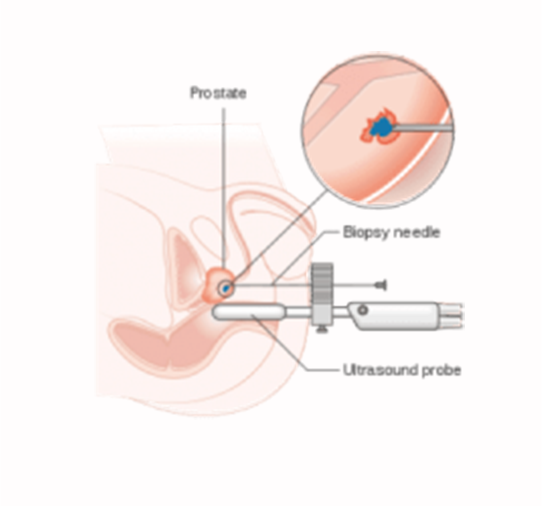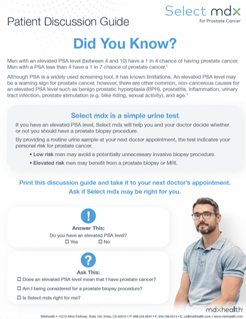
If you have an elevated PSA level, it is important to understand your risk for aggressive, potentially lethal, prostate cancer.
Are You At-Risk for Aggressive
Prostate Cancer?
The Select mdx Test Can Help Answer that Question
If you have an elevated PSA level, it is important to understand your risk for aggressive, potentially lethal, prostate cancer. Select mdx can provide you and your urologist with better insight on your personal prostate cancer risk and whether you should have an initial prostate biopsy.
It’s Non-Invasive and Convenient
- All you need to do is provide a urine specimen during a visit to your urologist’s office.
- The specimen will be sent to Mdxhealth for Select mdx for Prostate Cancer testing.
- Your Select mdx test results will be sent to your urologist within 5 days.
How Select mdx Works
1 in 8 men will be diagnosed with prostate cancer in their lifetime, but not all prostate cancer is aggressive or deadly, and early diagnosis is key. Select mdx fills the gap left by vague and inconsistent screening guidelines to uncover a patient’s risk for clinically significant prostate cancer. Learn how the Select mdx urine test can reveal your patients’ risk.
What do the Select mdx Test Results
Reveal?
The Select mdx test measures the amount of two genes associated with aggressive prostate cancer. The measurement of these prostate cancer specific genes in combination with traditional clinical risk factors—such as your age, PSA (prostate-specific antigen) level, prostate volume, family history of prostate cancer, and the outcome of a digital rectal examination (DRE) results in your Select mdx personalized risk score.
Your Select mdx risk score gives you and your physician better insight on whether or not prostate cancer is likely to be found upon initial biopsy. Knowing your Select mdx risk score, you and your physician can make an informed decision if you may benefit from a prostate biopsy that could detect cancer at an early stage so you can receive appropriate treatment sooner. The Select mdx test is included in the 2020 National Comprehensive Cancer Network (NCCN) Guidelines for Prostate Cancer Early Detection.

Action You Can Initiate and Knowledge You Can Use
If you learn that your PSA level is abnormal and/or that you have other clinical risk factors (age, increased prostate volume, family history of prostate cancer, abnormal DRE result) for prostate cancer, talk to your urologist about ordering the Select mdx test—before having a prostate biopsy. Select mdx will give you and your urologist additional prostate cancer-specific information to help determine if you should have a prostate biopsy.
Do You Have an Elevated PSA?
The prostate-specific antigen (PSA) test is a screening tool to identify men at increased risk for prostate cancer. This simple blood test measures the amount of prostate-specific antigen released from the prostate. A PSA test is usually done before a prostate biopsy.
As you get older and your prostate gets bigger, the amount of PSA in your blood rises. An increased PSA level is a first indication that you may have a problem with your prostate. However, this does not necessarily mean you have prostate cancer. An inflamed prostate (prostatitis, for instance, due to a previous urinary infection) or an enlarged prostate (benign prostate hyperplasia (BPH), adenoma) also can cause your PSA levels to rise.
While PSA is a good screening tool, it is only one piece of the puzzle. A PSA test has these limitations:
- It has limited ability to discriminate between benign prostate conditions and prostate cancer.
- It is not able to discriminate a more aggressive prostate cancer from one that is less likely to cause harm.
Information and Terminology to Prepare
You for a Discussion with Your Urologist
Prostate Biopsy and Gleason Score
During a prostate biopsy, the doctor takes small pieces of tissue from different areas of the prostate using a thin needle. There are two types of prostate biopsies:
- TRUS-guided biopsy: guided by transrectal ultrasound, a needle is inserted into the prostate under local anesthesia through the wall of the rectum. This is the most commonly used method.
- Transperineal (template or targeted) biopsy: guided by either MRI or a CT scan, a needle is inserted through the area of skin between the testicles and the rectum.

A pathologist observes the tissue under a microscope to see if any cancer cells are present. If the answer is yes, it is important to determine if the cancer is clinically insignificant or how aggressive it is. This determination is indicated by a biopsy score, known as the Gleason score, which ranges from 6 to 10. The higher the score, the more aggressive the cancer is.
The Difference Between Clinically Insignificant and Aggressive Prostate
The type of cancer a patient has, as indicated by the Gleason score, determines if treatment is necessary and which treatment is most suitable.
- A Gleason score of less than or equal to 6 generally means the prostate cancer is clinically insignificant since it grows slowly. This type may never cause problems, even if left untreated.
- A Gleason score equal to or greater than 7 generally means the prostate cancer is more aggressive. This type of cancer is more likely to spread outside the prostate and can become life-threatening. Therefore, it should be diagnosed as soon as possible to ensure proper and timely treatment, improving the chances of survival.
Mdxhealth is regulated under the Clinical Laboratory Improvement Amendments (CLIA) and College of American Pathologists (CAP) as an accredited laboratory to perform high complexity clinical testing. The Select mdx for Prostate Cancer test was developed, and its performance characteristics determined by Mdxhealth. It has not been reviewed by the U.S. Food and Drug Administration. The FDA has determined such clearance or approval is not necessary. The test is intended for use as an aid to clinicians for patient management decisions about the need for a prostate biopsy in men with clinical risk factors suggesting an increased risk for prostate cancer. Use outside of this indication has not been validated by Mdxhealth. Test results should be interpreted in conjunction with other laboratory and clinical data available to the clinician and relevant guidelines on the decision for biopsy. CLIA# 05D2033858; CAP# 8015399
While PSA is a good screening tool, it is only one piece of the puzzle. A PSA test has these limitations:
- It has limited ability to discriminate between benign prostate conditions and prostate cancer.
- It is not able to discriminate a more aggressive prostate cancer from one that is less likely to cause harm.
References
1 Van Neste L, et al. (2016) Detection of High-grade Prostate Cancer Using a Urinary Molecular Biomarker-Based Risk Score. Eur Urol, Nov; 70(5): 740-748.
2 National Cancer Institute 2019, accessed August 9, 2019
Pay My Bill
We’ve made paying your bill hassle-free. Simply log in to our patient portal to make your payment.



















